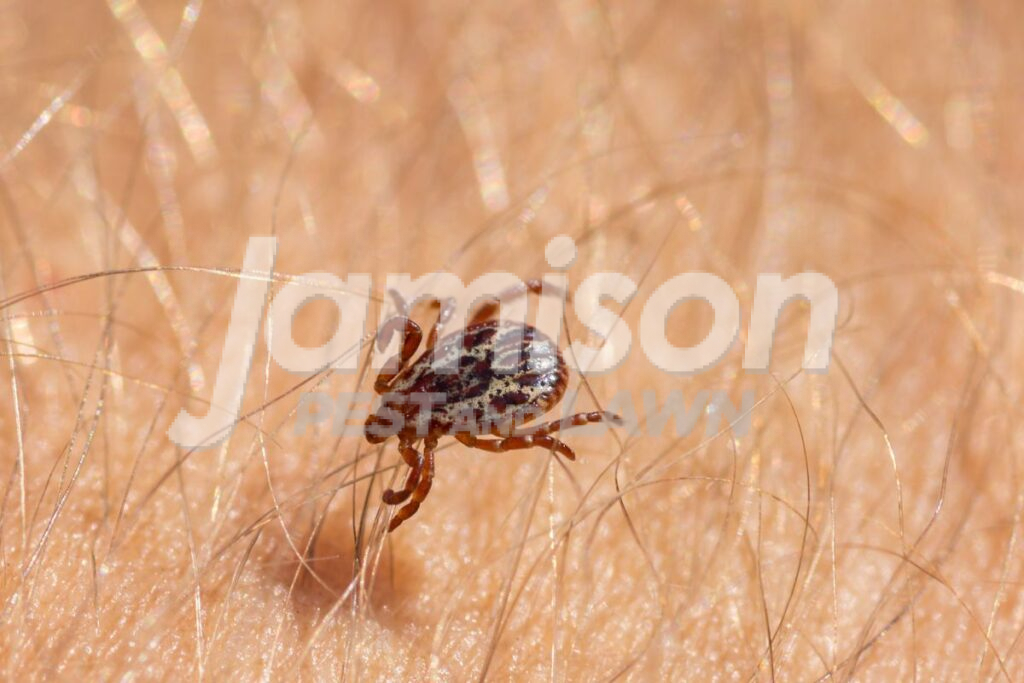Ticks are tiny, pesky parasites that can cause big problems. Understanding how long ticks can live in a house is important for homeowners who want to keep their families and pets safe from these unwelcome guests. In this blog post, we’ll explore the lifespan of ticks indoors, where they hide, and how you can protect your home from these troublesome invaders.
What Are Ticks?
Ticks are small arachnids that feed on the blood of animals and humans. They are known for spreading diseases such as Lyme disease, Rocky Mountain fever, and more. Ticks are usually 1 to 3 mm long, or about the size of a grain of rice.
What Is The General Lifespan Of Ticks?
Tick lifespans can vary depending on the species and environmental conditions. Generally, ticks can live for several months to a few years. They have four stages in their life cycle: egg, larva, nymph, and adult. They need to feed on blood starting at the larva phase to grow and develop.
The first stage involves the tick eggs’ hatching. Depending on temperature and humidity, these eggs hatch in about two weeks.
Once hatched, larvae, also known as “seed ticks,” can survive for about eight months without feeding. However, they need to feed before the next developmental phase can begin. The larvae then develop into a nymph, which is the third life stage. Nymphs can live for up to a year without a blood meal.
The final stage of the tick life cycle is the adult stage. Adult ticks can survive for up to two years.
So in general, the average lifespan of a tick is anywhere between one and three years. The exact lifespan depends on whether the tick is feeding and how long it has been attached to a host.
To know more about ticks, check out: A Homeowner’s Guide To Tick Control In Memphis, MN
Types Of Ticks And How Long Can They Live In Your House
Good news first: ticks don’t typically thrive inside our homes. Most ticks can only survive for about 24 hours in a standard indoor environment. That’s because they prefer humid, warm outdoor spaces.
However, under certain conditions, some ticks might survive a bit longer. Below we have a list of some of the most common types of ticks and how long they can live in the interiors of your home.
Black Legged Ticks:

Black-legged ticks, also known as deer ticks, are among the most common types of ticks in Tennesee. These can survive for only one or two days in normal conditions. However, if the temperature of the indoors is more humid and there is moisture present, they can live longer.
Brown Dog Ticks:

While most ticks are just passing through, the brown dog tick is an exception. These pesky critters can complete their entire life cycle indoors, infesting homes and kennels. If you have a dog, be extra vigilant, as they’re the preferred host for this tick species.
American Dog Ticks:

American dog ticks typically do not survive well indoors. They prefer outdoor environments and usually die within a few days to a week if they find themselves inside a house.
Lone Star Ticks:
Lone star ticks also prefer outdoor habitats and usually do not survive long indoors, typically dying within a few days to a week without access to a host.
Also Read: 7 Different Types Of Ticks Found In Tennessee
How to Know if There is a Tick in Your House
Detecting ticks in your home early can help prevent harm to your pets and family. Here are some signs and steps to identify if ticks have made their way into your living space:
Spotting Ticks on Pets:
If your pet is scratching more than usual or you notice ticks attached to their fur, especially around the ears, neck, and paws, this could indicate a tick problem. Pets may also become restless or anxious due to the irritation caused by ticks.
Finding Ticks on Yourself or Family Members:
Look for small red tick bites on your skin, particularly in areas such as the armpits, groin, and scalp. If you or a family member have been outdoors recently, it’s important to check for ticks.
Tick Droppings:
Ticks leave behind tiny black droppings that can be found in pet bedding, carpets, and furniture. If you notice these droppings, it’s a sign that ticks may be present in your home.
Unusual Pet Behavior:
If your pet is avoiding certain areas of the house or seems unusually uncomfortable in specific spots, it could be because ticks are present. Pay attention to changes in your pet’s behavior, as it can be an indicator of a tick problem.
What to Do if You Find a Tick in Your House
Remove it Safely:
If the tick has bitten a pet or family member, use tweezers to grasp it close to the skin and pull it outward. Avoid twisting or crushing the tick, as this could release harmful bacteria.
Dispose of it Properly:
Don’t just toss it in the trash! Place the tick in a sealed bag or container with rubbing alcohol to kill it.
Clean the Bite Area:
Wash the tick bite with soap and water, and apply antiseptic for further protection.
Monitor for Symptoms:
Watch for signs of illness, such as fever, rash, or fatigue, and consult a doctor if necessary.
Prevention Strategies To Keep Ticks Away From Your Home and Pets
Regularly Inspect and Groom Pets:
To minimize the risk of ticks entering your home, it’s crucial to frequently inspect your pets for any signs of ticks, especially after they have been outside. Regular grooming, including brushing and bathing, can help remove any ticks that may have attached to your pet’s fur.
Vacuum Frequently:
Regular vacuuming is essential to reduce the presence of ticks in your home. Focus on areas where pets spend most of their time, such as carpets, upholstered furniture, and pet bedding.
Want To Get Rid Of Ticks? Jamison Pest and Lawn Can Help
If you suspect a tick infestation or have ongoing problems with ticks in your home, don’t hesitate to contact our expert team at Jamison Pest and Lawn. We are premier pest control professionals who have years of experience removing ticks from homes and lawns in Tennessee.
Our team has the expertise and tools to effectively eliminate these unwanted guests.
Other than ticks, our team offers other pest control and lawn maintenance services in Tennessee and Mississippi. So if you are struggling with an infestation or want general services, call us today at (901) 452-1505.




